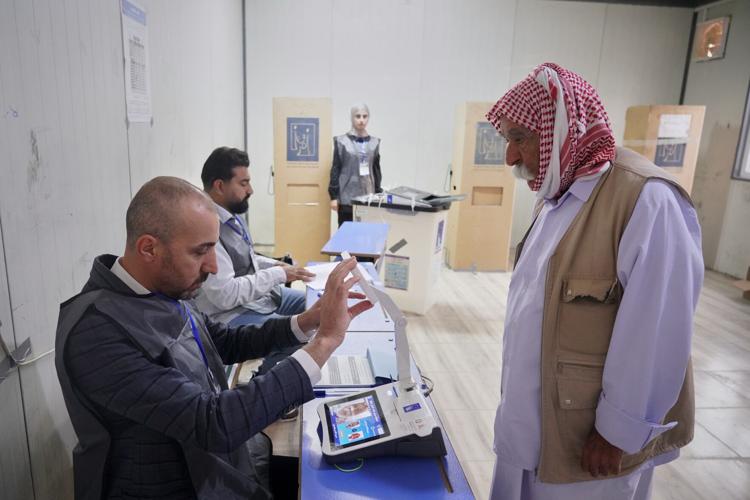World
Iraqi Security Forces and Yazidis Cast Ballots in Early Election

Members of the Iraqi security forces and displaced individuals, including many from the Yazidi community, participated in early voting on March 3, 2024, ahead of the parliamentary elections scheduled for March 5. This election is pivotal as it may determine whether Prime Minister Mohammed Shia al-Sudani secures a second term. The voting occurs amid concerns regarding potential conflicts in the region, notably between Israel and Iran, and Iraq’s delicate balance between Tehran and Washington.
Approximately 1.3 million military and security personnel, along with around 26,000 displaced individuals, are eligible to cast their votes, with a total of 7,744 candidates competing, predominantly from sectarian-aligned parties. Many Yazidis, who fled their homes over a decade ago due to violence from the Islamic State group, voted at a polling station in a camp near Dohuk, located in the semi-autonomous Kurdish region of northern Iraq.
Challenges for Displaced Yazidis
Despite some Yazidis returning to their homes in Sinjar, many still face significant obstacles. Political disputes and a lack of infrastructure prevent a full return. As Khedhir Qassim, a displaced Yazidi from Sinjar, noted, “Eleven years passed and the situation is the same.” He expressed skepticism about the ability of new leaders to effect change, emphasizing the need for support to rebuild their devastated areas.
Another displaced Yazidi, Edris Zozani, indicated his support for the Kurdish Democratic Party (KDP), one of Iraq’s primary Kurdish political entities. He articulated the challenge of independent Yazidi candidates, stating, “If we have independent Yazidi candidates, they wouldn’t be able to represent us effectively.” He believes that candidates aligned with strong political lists, like the KDP, would be better positioned to advocate for the Yazidi community.
Military Voting in Baghdad
In the capital city of Baghdad, early voting also included Iraqi soldiers, police forces, and members of the Popular Mobilization Forces (PMF), a coalition primarily made up of Shiite militias supported by Iran. Although the PMF was formally integrated into Iraq’s military structure in 2016, it continues to operate with considerable autonomy, complicating the relationship between Baghdad and Washington.
One militiaman, who spoke anonymously due to restrictions on media interaction, expressed his support for a list that defends the PMF, though he did not specify further. This sentiment reflects the ongoing tension surrounding the PMF’s role in Iraqi politics and its future, particularly amid legislative discussions about solidifying the ties between the military and the PMF.
The elections not only serve as a critical moment for Iraq’s governance but also highlight the ongoing struggles faced by marginalized communities like the Yazidis. As they navigate the political landscape, many hope for a future that supports their rights and facilitates the rebuilding of their communities.
-

 Politics2 weeks ago
Politics2 weeks agoHamas Chief Stresses Disarmament Tied to Occupation’s End
-

 Science2 weeks ago
Science2 weeks agoOhio State Study Uncovers Brain Connectivity and Function Links
-

 Entertainment2 weeks ago
Entertainment2 weeks agoMegan Thee Stallion Exposes Alleged Online Attack by Bots
-

 Science3 weeks ago
Science3 weeks agoResearchers Challenge 200-Year-Old Physics Principle with Atomic Engines
-

 Entertainment2 weeks ago
Entertainment2 weeks agoPaloma Elsesser Shines at LA Event with Iconic Slicked-Back Bun
-

 Top Stories2 weeks ago
Top Stories2 weeks agoFederal Agents Detain Driver in Addison; Protests Erupt Immediately
-

 Business2 weeks ago
Business2 weeks agoHome Depot Slashes Prices on Halloween Favorites Up to 75%
-

 Top Stories2 weeks ago
Top Stories2 weeks agoOrioles Hire Craig Albernaz as New Manager Amid Rebuild
-

 Entertainment2 weeks ago
Entertainment2 weeks agoSyracuse Stage Delivers Lively Adaptation of ‘The 39 Steps’
-

 Top Stories2 weeks ago
Top Stories2 weeks agoWill Smith Powers Dodgers to World Series Tie with Key Homer
-

 World3 weeks ago
World3 weeks agoGlobal Military Spending: Air Forces Ranked by Budget and Capability
-

 Politics3 weeks ago
Politics3 weeks agoNHP Foundation Secures Land for 158 Affordable Apartments in Denver









